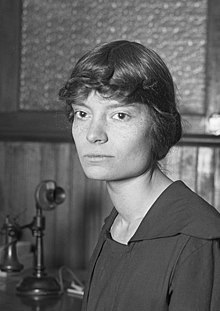Our website is made possible by displaying online advertisements to our visitors.
Please consider supporting us by disabling your ad blocker.
Dorothy Day
Dorothy Day | |
|---|---|
 Day in 1916 | |
| Born | November 8, 1897 New York City, U.S. |
| Hometown | Chicago, Illinois, U.S. |
| Died | November 29, 1980 (aged 83) New York City, U.S. |
| Resting place | Cemetery of the Resurrection, New York City |
| Part of a series on |
| Anarchism |
|---|
 |
| Part of a series on |
| Christian socialism |
|---|
Dorothy Day (November 8, 1897 – November 29, 1980) was an American journalist, social activist and anarchist who, after a bohemian youth, became a Catholic without abandoning her social activism. She was perhaps the best-known political radical among American Catholics.[1][2]
Day's conversion is described in her 1952 autobiography, The Long Loneliness.[3][4] Day was also an active journalist, and described her social activism in her writings. In 1917 she was imprisoned as a member of suffragist Alice Paul's nonviolent Silent Sentinels. In the 1930s, Day worked closely with fellow activist Peter Maurin to establish the Catholic Worker Movement,[5] a pacifist movement that combines direct aid for the poor and homeless with nonviolent direct action on their behalf. She practiced civil disobedience, which led to additional arrests in 1955,[6] 1957,[7] and in 1973 at age 75.[1]
As part of the Catholic Worker Movement, Day co-founded the Catholic Worker newspaper in 1933, and served as its editor from 1933 until her death in 1980. In this newspaper, Day advocated the Catholic economic theory of distributism, which she considered a third way between capitalism and socialism.[8][9] Pope Benedict XVI used her conversion story as an example of how to "journey towards faith… in a secularized environment."[3] In an address before the United States Congress, Pope Francis included her in a list of four exemplary Americans who "buil[t] a better future".[10]
The Catholic Church has opened the cause for Day's possible canonization, which was accepted by the Holy See for investigation. For that reason, the Church refers to her with the title of Servant of God.[11]
- ^ a b Elie (2003), p. 433.
- ^ Cannon, Virginia (November 30, 2012). "Day by Day; A Saint for the Occupy Era?". The New Yorker. Archived from the original on October 24, 2020. Retrieved September 30, 2015.
- ^ a b Pope Benedict XVI (February 13, 2013). "General Audience, 13 February 2013". Vatican. Archived from the original on November 23, 2019. Retrieved September 30, 2015.
- ^ Elie (2003), p. 43.
- ^ Kreitner, Richard (November 29, 2015). "November 29, 1980: Dorothy Day Dies". ISSN 0027-8378. Retrieved October 16, 2024.
- ^ Elie (2003), pp. 236–37.
- ^ Elie (2003), p. 279.
- ^ "G.K. Chesterton and Dorothy Day on Economics: Neither Socialism nor Capitalism (Distributism)". cjd.org. October 2001. Archived from the original on October 3, 2015. Retrieved October 2, 2015.
- ^ "The ChesterBelloc Mandate: Dorothy Day and Distributism". Archived from the original on November 16, 2018. Retrieved October 2, 2015.
- ^ Pope Francis (September 24, 2015). "Visit to the Joint Session of the United States Congress". Vatican. Archived from the original on April 3, 2019. Retrieved September 30, 2015.
- ^ "US bishops endorse sainthood cause of Catholic Worker's Dorothy Day". Catholic New Service. November 13, 2012. Archived from the original on December 7, 2012. Retrieved December 1, 2012.
Previous Page Next Page


